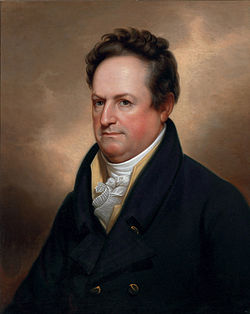Main article: 1820 United States presidential election
| ||||||||||||||||||||||||||
 County results Monroe 70–80% 80–90% 90–100% | ||||||||||||||||||||||||||
| ||||||||||||||||||||||||||
A presidential election was held in Pennsylvania in 1820 as part of the 1820 United States presidential election. Voters chose 25 representatives, or electors to the Electoral College, who voted for President and Vice President. Only 24 electoral votes were cast from Pennsylvania, however, due to one of the electors having died. [1]
Contents
During this election, James Monroe was re-elected by a large margin. Pennsylvania voted for Monroe over opposition candidate DeWitt Clinton.



